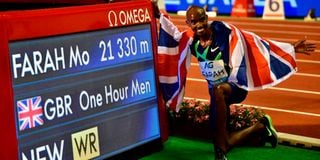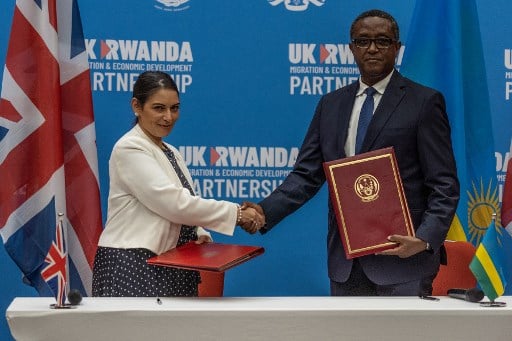Star runner trafficked from Africa forced to work as slave

Britain's Mo Farah celebrates after victory and a world record in the men's one-hour event at The Diamond League AG Memorial Van Damme athletics meeting at The King Baudouin Stadium in Brussels on September 4, 2020.
What you need to know:
- When Sir Mohamed Farah, the world’s greatest track distance runner, told his story in a documentary for the BBC, many in the audience wept.
- But who arranged his trafficking to London remained a mystery.
This story is about a sportsman, but it is not about sport – rather, it tells of pain, deceit, fear and threat, but ultimately of victory and peace.
When Sir Mohamed Farah, the world’s greatest track distance runner, told his story in a documentary for the BBC, many in the audience wept. You can understand why.
Mo Farah was trafficked to London from Djibouti as a child of nine and forced to work as a domestic servant. He was given the name Mohamed Farah, which belonged to another boy.
The woman who accompanied him from Africa ripped up a paper with his family’s contacts and said, “If you ever want to see your family again, don’t say anything.” Said Sir Mo, “At that moment, I knew I was in trouble.”
He was forced to do housework and look after small children for a Somali family.
For two years he was not allowed to attend school. “Often I would just lock myself in the bathroom and cry,” Sir Mo said.
A break came at age 11 when he enrolled at Feltham Community College. His form tutor, Sarah Rennie, said he looked “unkempt and uncared for,” spoke little English and was “emotionally and culturally alienated”.
But when he hit the athletics track he came alive. “The only thing I could do to get away from this (living situation) was to get out and run,” he said.
Eventually, Sir Mo confided in his PE teacher, Alan Watkinson, about his true identity — his real name was Hussein Abdi Kahin — and his situation as a house slave.
Mr Watkinson contacted social services and arranged for Mo to be fostered by another family. “From that moment, everything got better,” he said. “That’s when the real Mo came out.”
As the race victories increased and Mo’s profile grew, a woman approached him in a London restaurant and gave him a tape. It was a recorded message from his mother, Aisha, and it contained a phone number.
Sir Mo thus talked to his mother for the first time in years and eventually, the story of his life emerged.
He was born in the breakaway state of Somaliland, which was plagued by war.
His mother told him, “I sent you away for safety to your uncle in Djibouti.”
Technical illegality
But who arranged his trafficking to London remained a mystery.
“No one told me,” his mother said. “I lost contact with you. We didn’t have phones, roads, anything.”
Meanwhile, Sir Mo became a British citizen under the name of Mohamed Farah — technical illegality but one which the authorities said they would not pursue — the winner of four Olympic and six World Championship gold medals, plus a knighthood.
Sir Mo told his story to highlight the evil of trafficking. “What saved me was that I could run,” he said. But for those without such talents, there is just pain, fear and threat.
* * *
Reporter, writer, editor, academic, mentor, educator ... few Kenyans had the range of skills, not to mention the personal charm, of Joe Kadhi, who sadly died in Nairobi Hospital last June 30.
It must have been as long ago as the 1960s that I first met Joe as a young reporter (for Taifa, was it?) at the old Nation House.
The quality that struck me immediately was his ability to get on with everybody.
Ethnic groups did not matter to Joe, nor did skin colour. He treated messengers as politely as he did his colleagues, politicians and foreign correspondents urgently seeking his knowledge and expertise.
After years of top performance with the Nation at the managing editor level, he entered full-time media training, teaching at the University of Nairobi, Addis Ababa University and a private university in Nairobi, the US International University – Africa (USIU).
One of Joe’s old colleagues, John McHaffie, a former chief sub-editor of the Daily Nation, has suggested a way in which Joe’s contribution to journalism in Kenya could be given permanent form.
He wrote: “Universities and colleges around the world pay tribute to such inspirational figures by naming lecture halls or even wings after them ... Joe would certainly seem like a worthy candidate.”
An excellent idea! We await a response.
* * *
Last week’s item about a man who killed his cancer-stricken wife to save her from further pain lacked a crucial element – the court’s decision.
Graham Mansfield, 73, was charged with murdering his wife, Dyanne, 71, by cutting her throat. However, the jury found him guilty of the lesser charge of manslaughter.
Justice Goose imposed a two-year suspended sentence. He said the killing was “an act of love, of compassion, to end her suffering”.
* * *
Pub notices:
If you are drinking to forget, please pay in advance.
Beer is not the answer, it’s the question. The answer is, Yes.
Education is important, but beer is importanter.
Charges for answering wife/girlfriend calls: He just left: £2. Hasn’t been in all night: £5. Haven’t seen him for weeks: £10. Never comes here anymore: £15.





